Jarvis ch 22 - Study guides, Class notes & Summaries
Looking for the best study guides, study notes and summaries about Jarvis ch 22? On this page you'll find 36 study documents about Jarvis ch 22.
Page 4 out of 36 results
Sort by
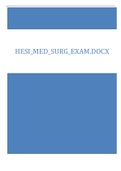
-
HESI_MED_SURG_EXAM.DOCX
- Exam (elaborations) • 44 pages • 2022
-
- $17.99
- + learn more
HESI_MED_SURG_EXAM.DOCX 1. Which assessment is most important for the nurse to perform on a client who is hospitalized for Guillain-Barre syndrome that is rapidly progressing? • Respiratory effort. • Unsteady gait. • Intensity of pain. • Ability to eat. Guillain-Barre syndrome causes paralysis or weakness that typically starts at the feet and progresses upwards. As the condition progresses, the nurse must ensure that the client is able to breathe effectively. Heuther, Understa...
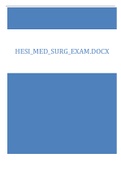
-
HESI_MED_SURG_EXAM.DOCX
- Exam (elaborations) • 44 pages • 2022
-
- $16.49
- + learn more
HESI_MED_SURG_EXAM.DOCX 1. Which assessment is most important for the nurse to perform on a client who is hospitalized for Guillain-Barre syndrome that is rapidly progressing? • Respiratory effort. • Unsteady gait. • Intensity of pain. • Ability to eat. Guillain-Barre syndrome causes paralysis or weakness that typically starts at the feet and progresses upwards. As the condition progresses, the nurse must ensure that the client is able to breathe effectively. Heuther, Understa...
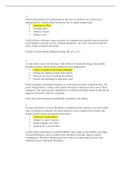
-
HESI_Med_Surg_Exam.docx
- Exam (elaborations) • 43 pages • 2022
-
- $17.99
- + learn more
HESI_Med_Surg_E 1. Which assessment is most important for the nurse to perform on a client who is hospitalized for Guillain-Barre syndrome that is rapidly progressing? Respiratory effort. Unsteady gait. Intensity of pain. Ability to eat. Guillain-Barre syndrome causes paralysis or weakness that typically starts at the feet and progresses upwards. As the condition progresses, the nurse must ensure that the client is able to breathe effectively. Heuther, Understanding Pat...
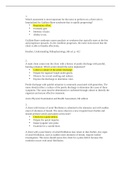
-
HESI_Med_Surg_Exam.docx
- Exam (elaborations) • 43 pages • 2022
-
- $15.49
- + learn more
1. Which assessment is most important for the nurse to perform on a client who is hospitalized for Guillain-Barre syndrome that is rapidly progressing? Respiratory effort. Unsteady gait. Intensity of pain. Ability to eat. Guillain-Barre syndrome causes paralysis or weakness that typically starts at the feet and progresses upwards. As the condition progresses, the nurse must ensure that the client is able to breathe effectively. Heuther, Understanding Pathophysiology, 6t...
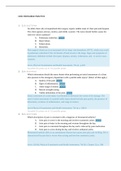
-
MEDICAL SU 400 HESI MEDSURGE PRACTICE QUESTIONS AND ANSWERS( COMPLETE SOLUTION RATED A)
- Exam (elaborations) • 41 pages • 2021
-
- $19.49
- + learn more
HESI MEDSURGE PRACTICE 1. 1.ID: 14 An adult client who is hospitalized after surgery reports sudden onset of chest pain and dyspnea. The client appears anxious, restless, and mildly cyanot ic. The nurse should further assess the client for which condition? A. Pulmonary embolism. Correct B. Heart failure. C. Tuberculosis. D. Bronchitis. Post-surgical clients are at an increased risk for deep vein thrombosis (DVT), which may result in pulmonary embolism if the clot breaks off and travels to the lu...
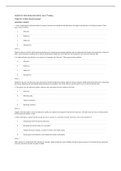
-
HAP FINAL TEST BANK QUESTIONS: Jarvis 7th Edition Ch 1-Ch 18 Just download and ACE
- Exam (elaborations) • 149 pages • 2021
-
- $12.99
- + learn more
HAP FINAL TEST BANK QUESTIONS: Jarvis 7th Edition Ch 1-Ch 18 Just download and ACE HAP FINAL TEST BANK QUESTIONS: Jarvis 7th Edition Chapter 01: Evidence-Based Assessment MULTIPLE CHOICE 1. After completing an initial assessment of a patient, the nurse has charted that his respirations are eupneic and his pulse is 58 beats per minute. These types of data would be: a. Objective. b. Reflective. c. Subjective. d. Introspective. ANS: A Objective data are what the health professional obs...

How did he do that? By selling his study resources on Stuvia. Try it yourself! Discover all about earning on Stuvia


